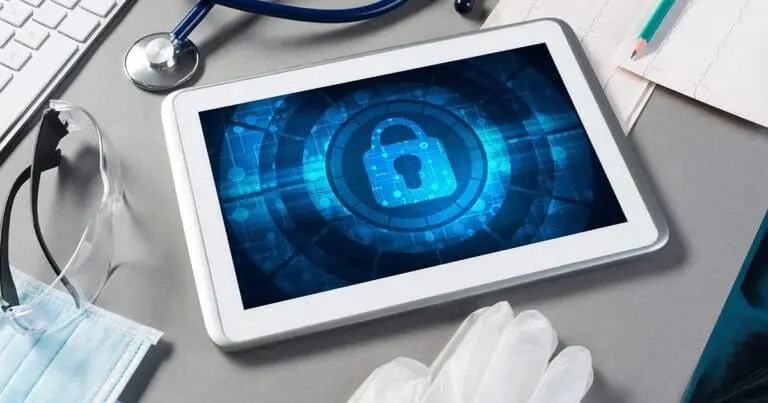Cybersecurity in Healthcare: Dangers, Impacts, and Solutions

In today’s tech-driven world, cybersecurity is more important than ever – and nowhere does that hold truer than in the healthcare industry as evidenced by recent cyber attacks on 16 US healthcare institutions.
So what happened?
A recent cyberattack disrupted computer systems at hospitals in Connecticut and Pennsylvania, causing diversions of ambulances and affecting patient care.
The hack targeted Prospect Medical Holdings, impacting all its healthcare facilities across multiple states.
Despite offers of federal assistance, the affected hospitals continue to operate with limited capacity, highlighting the growing cybersecurity challenges faced by healthcare institutions.
With an ever-growing wealth of sensitive data to protect, healthcare organizations must prioritize cybersecurity or face potentially devastating consequences like data breaches.
This is why it’s imperative to educate yourself on the dangers associated with a lack of cybersecurity in the healthcare sector as well as concrete solutions for building strong security teams for optimal safety.
Why is cybersecurity in healthcare important?
Cybersecurity in healthcare is important for a number of key functions including EHRs, telemedicine, IoT devices, cloud services, and data analytics.
Electronic health record cybersecurity
Electronic health records (EHR) contain highly sensitive patient information, making them a prime target for cybercriminals.
A breach of these records can lead to identity theft, fraud, or even potential harm to patients through unauthorized changes to their medical details.
Therefore, cybersecurity measures are vital in protecting these records and maintaining the integrity of patient data.
Telemedicine cybersecurity
As the COVID-19 pandemic has accelerated the adoption of telemedicine, cybersecurity in this realm has become critical.
Remote consultations require the secure transmission of sensitive health information between patients and healthcare providers.
Without robust cybersecurity measures, this data could be intercepted by malicious actors, compromising patient privacy and trust in telemedicine services.
IoT devices in patient care
Internet of Things (IoT) devices are increasingly prevalent in healthcare, offering innovative solutions for patient care and monitoring.
However, these devices also present new cybersecurity risks, as they can be targeted by hackers aiming to access sensitive data or disrupt healthcare services.
Therefore, it’s essential to apply stringent cybersecurity protocols to ensure these devices operate safely and securely within the healthcare setting.
Healthcare cloud services
Healthcare cloud services provide a platform for storing vast amounts of patient data in a centralized, easily accessible manner.
However, the use of cloud technology also raises significant cybersecurity concerns as any breach could expose a treasure trove of highly sensitive patient information to cybercriminals.
Thus, strict cybersecurity measures must be implemented to protect data integrity and maintain patient trust in the use of healthcare cloud services.
Healthcare data analytics
Healthcare data analytics involves parsing through vast amounts of patient data to identify patterns, make predictions, and enhance care.
However, this aggregation of data poses cybersecurity risks as it could attract cybercriminals seeking to steal or manipulate this valuable information.
As such, robust cybersecurity measures are critical in protecting the integrity of healthcare data analytics.
Dangers of cyberattacks in healthcare
There are a number of dangers of cyberattacks in healthcare that include patient safety, confidentiality and trust, financial implications, operational disruptions, and reputational damage.
Patient safety
Cyberattacks on healthcare institutions can have a direct impact on patient safety, as malicious actors may attempt to alter or manipulate medical records.
This could adversely affect patient care and lead to potential health complications due to incorrect- or delayed diagnosis and treatment.
And, as evidenced by these recent security breaches, ambulences were diverted and certain elective surgurys were canceled until further notice, delaying patient care.
Patient confidentiality & trust
The sanctity of patient-doctor confidentiality is a cornerstone of effective healthcare, fostering an environment where patients feel secure to disclose vital health information.
However, breaches in cybersecurity can erode this essential trust, leading to apprehension about sharing sensitive data and consequently impacting the quality of care.
Such breaches can cause lasting damage to the patient-provider relationship, undermining the fundamental trust that underpins effective healthcare provision.
Financial implications
Cybersecurity breaches can inflict severe financial burdens upon healthcare organizations, primarily due to the substantial costs associated with data breach remediation.
Moreover, such incidents can lead to potential legal liabilities, with hefty fines imposed for non-compliance with data protection regulations.
Additionally, breaches can significantly impact insurance premiums and may violate contractual obligations, further exacerbating the financial implications of ineffective cybersecurity in healthcare.
Operational disruptions
Ransomware attacks pose a significant threat to healthcare institutions, having the capacity to disrupt operations and halt critical services.
This can severely impact patient care, creating delays in treatment plans and interruptions to ongoing care due to inaccessible or compromised patient data.
In the worst-case scenarios, these operational disruptions can even lead to life-threatening situations, underscoring the urgency of effective cybersecurity measures in the healthcare sector.
Reputational damage
A healthcare institution’s reputation can suffer long-term damage in the aftermath of a cybersecurity breach, as such incidents shake public faith and erode confidence in the institution’s ability to safeguard sensitive data.
The challenge of rebuilding trust is a daunting task, often requiring significant time and resources dedicated to improving cybersecurity measures and communicating these improvements to patients.
Regaining patient confidence is a gradual process that hinges on demonstrating a consistent commitment to data protection, underscoring the importance of proactive, robust cybersecurity in the healthcare sector.
How to fortify healthcare cybersecurity
- Regular risk assessments
- Employee training and awareness
- Multi-factor authentication
- Regular backups
- Patch management
- Incident response plan
- Access controls
Regular risk assessments
A comprehensive risk assessment is essential in understanding the current security posture of an organization and identifying existing threats.
This involves evaluating potential risks, such as vulnerabilities in systems or weak spots in data protection procedures, to develop a plan of action for improving cybersecurity measures.
Regular risk assessments can ensure that all possible threats are identified and addressed, enabling healthcare organizations to stay ahead of emerging cyber threats.
Employee training and awareness
Human error is a major source of cyber risk, and employee training can help reduce this threat by teaching staff the importance of cybersecurity protocols and best practices.
This includes providing education on common security issues, such as phishing scams, password protection, and data privacy.
Furthermore, it’s essential to keep employees up-to-date on the latest cybersecurity trends to ensure they are aware of evolving threats and stay vigilant against potential cyberattacks.
Multi-factor authentication
Multi-factor authentication (MFA) requires users to provide multiple types of credentials for access, adding an extra layer of security beyond passwords or PINs.
These measures can help protect against unauthorized data access and prevent cybercriminals from gaining control of systems.
Regular backups
Regular backups are essential for maintaining data integrity in the event of an attack or other disruption.
By creating copies of critical data, organizations can quickly restore disrupted services and minimize disruption to operations.
To ensure that the data remains safe, backups should be securely stored in an offsite location or cloud-based storage system.
Patch management
Software patch management is a crucial component of any security framework, as it ensures that all systems are up-to-date with the latest security updates and patches.
Without regular patch management, organizations may be vulnerable to threats such as malware or ransomware, making it essential for healthcare providers to ensure their systems are patched regularly.
Incident response plan
Having an incident response plan in place is key to mitigating the damage caused by a cybersecurity breach.
This should include provisions on how to respond to a breach, such as notifying relevant authorities and stakeholders, and detailed steps to take following an attack.
By having a plan in place for responding to cyber incidents, healthcare organizations can more efficiently recover from breaches and limit their repercussions.
Access controls
Access controls are a crucial security measure for any organization, allowing the administrator to control who is granted access to certain resources or systems.
Access can be limited by factors such as role, time, and location, preventing unauthorized users from accessing sensitive data.
This helps ensure that only authorized personnel are able to access critical information and systems, limiting the risk of data breaches.
Building the right cybersecurity teams in healthcare
The best ways of building the right cybersecurity teams in healthcare is hiring specialists, investing in automation, continuous training and education, and collaborating with external experts.
Hiring specialists
Having an in-house cybersecurity team is essential for healthcare organizations, as it allows them to respond quickly and effectively to any security incidents.
To build a successful team, hiring specialists with the right skillset is key. This includes experts such as ethical hackers, system administrators, data protection officers, and risk analysts.
These professionals are invaluable in helping healthcare providers identify and address security vulnerabilities and build robust security systems.
Investing in automation
Tools such as automation can help streamline the process of detecting and responding to cyber threats, freeing up valuable resources for other tasks.
By leveraging automated solutions such as threat detection software or AI-based security systems, healthcare organizations can more quickly identify and address potential threats.
This allows them to respond to any incidents faster and with greater accuracy, enhancing the overall security posture of the organization.
Continuous training and education
Continuous training is essential for any cybersecurity team, as new threats are constantly evolving.
Organizations should invest in ongoing employee education to ensure their staff stay up-to-date on emerging threats and the latest best practices for data protection.
This can help improve the overall security posture of a healthcare provider and reduce the risk of cyberattacks.
Collaboration with external experts
Collaborating with external experts is also important in ensuring the security of healthcare data.
Organizations should seek out experienced information security consultants to help them identify any potential weaknesses in their systems and develop strategies for improving their cybersecurity measures.
These outside perspectives can provide valuable insight into existing threats and help healthcare providers build a more secure environment for their patients.
Preventing healthcare and hospital cyberattacks
Healthcare organizations must take proactive steps to protect their data and systems from cyber threats, as the consequences of a breach can be dire.
By implementing measures such as employee training, multi-factor authentication, patch management, and regular backups, healthcare providers can enhance their security measures and reduce the risk of a successful attack.
With the right measures in place, healthcare organizations can protect their data and prevent cyberattacks.
Looking to hire top-tier Cybersecurity Talent? We can help.
Every year, Mondo helps to fill over 2,000 open IT, Tech, and Digital Marketing positions nationwide.
More articles about hiring and industry trends:
- AI: The Latest Security Threats & What You Need to Do Now
- How To Support Workforce Optimization With Gig Workers
- Lessons From Unicorn Companies: Hiring Strategies for Rapid Growth
- 8 Myths About Hiring Gig Workers Every Employer Should Know
- HR Technology in Hiring: Streamlining Your Recruitment & Onboarding
- How Data & Analytics Can Improve Customer Experience: Tips & Strategies
- The Costly Consequences of Project Delays and How To Prevent Them
- Big Tech Job Cuts Don’t Mean Demand for Tech Professionals Is Over



